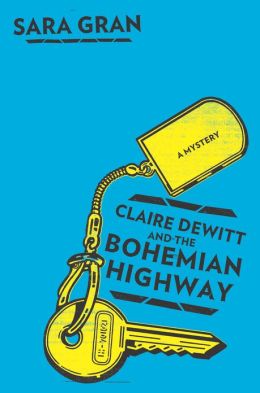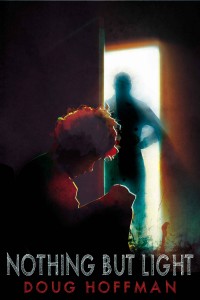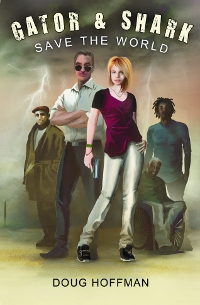Balls and Walnuts
more than you ever wanted to know
Category Archives: At the movies
Hey! Look! A contest!
You can win a signed, hard cover edition of Sara Gran’s Claire DeWitt and the Bohemian Highway
(see my review here) by helping me promote either my free ebook at Smashwords
or my Kindle book,
Here are the rules:
1. Multiple “entries” possible. Each entry will function as a lottery ticket, and I will decide the winner based on a drawing of such tickets. I have only one copy of Sara’s book, so there will be only one winner.
2. Each of the below will count as one entry:
a) Shout out this contest on twitter, facebook, or your blog. Your shout must include the URL for this blog post. If you do so on twitter, facebook, and your blog, that will count as three entries.
b) If you’ve read Gator & Shark, leave a review on Amazon or Goodreads. (If you do both, that will count as two entries.)
c) If you’ve read Nothing But Light, leave a review on Smashwords or Goodreads. (Ditto.)
3. Contest will end when interest dies down — probably next Monday evening.
4. Important: to get credit, you must indicate in the comments below what you have done.
Any questions?
D.
Do I look Sicilian?
Three times now, a patient has said to me, “You know who you remind me of? That guy from The Princess Bride!”
I’m always hopeful they mean Mandy Patinkin,
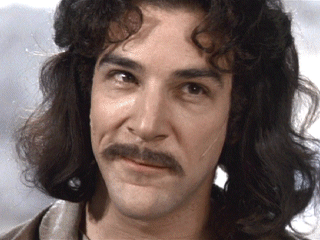
but each time, they meant Wally Shawn.
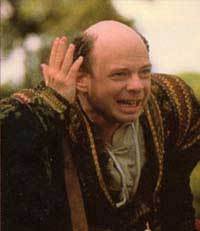
Could be worse. They could have meant Billy Crystal.
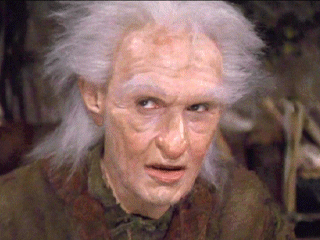
D.
I watch Prometheus so you don’t have to.
Don’t bother with this one, folks. Really.
Midway through Prometheus — possibly it was the scene where the biologist plays coochie-coo with a cobra-like alien that goes into a full threat display twice, and only kills him when he goes in for the third chin-tickle — I decided there was a niche for a review containing nothing but spoilers. Because surely there are folks in the world who would like to know what’s in this Alien prequel, but don’t want to waste their money.
If you’re part of that crowd, follow me below the fold.
What you never hardly ever see
With regard to race, Stephen Colbert has a running gag. “I don’t see race. People tell me I’m white, and I believe them because . . . ” Insert punchline. Last week, in the context of the preferential prosecution of black people for drug-related crimes, the ‘because’ was, “. . . because I get my drugs from a pharmacy.” He’ll also claim (with his typical in-character, right-wing intransigence) that racism no longer exists in America because, hey, look, we have a black President!
I doubt any of my readers would see this as anything but satire. What may not be immediately obvious, however, is the pervasive intolerance of the American entertainment industry to anyone who is other. Other than white, middle or upper class, and for the most part male. My question is, for the major media — TV, movies — how often do you see someone who is other in a role in which that otherness is not central? I would argue that the answer is hardly ever, with the notable exception of male black actors, especially Will Smith, Morgan Freeman, Samuel L. Jackson, and Denzel Washington. The big box office black actors are cast in blockbusters in which their blackness is not an issue. There can even be an interracial romantic angle without that interracial-ness becoming central (e.g., Will Smith’s relationship with Charlize Theron in Hancock). Other non-white males? Not so much.
I began thinking about this after reading the May Rolling Stone interview of Peter Dinklage, the 42-year-old, New Jersey-born star of HBO’s Game of Thrones, who happens to have achondroplasia.
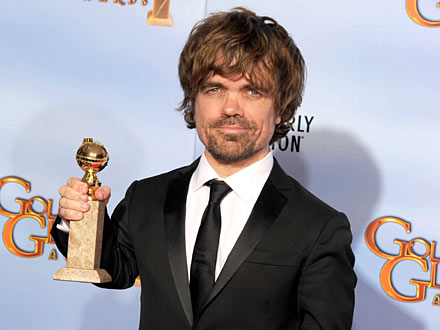
Folks who watch Game of Thrones will immediately note that Dinklage’s character is not only a dwarf, but his dwarfism is central to the role, and indeed not an episode goes by in which someone (usually in a pejorative way) points out his dwarfism. Yet the role of Tyrion is a far cry from the usual Wizard of Oz style little-man, or the cute/bumbling/avaricious dwarves of Time Bandits. Tyrion is a wonderfully complex character, easily one of the most noble characters in the story.
According to the Rolling Stone interview, Dinklage is particularly proud of his role in Death at a Funeral, in which his role was not written for a dwarf. Dinklage, a tremendously talented actor, may have broken into the mainstream. Time will tell.
But think about all of the roles we rarely see in American-made TV or movies:
We rarely see Asians cast in major roles in which their Asian-ness is not somehow an issue. Charlotte Sometimes, in which all three major characters are Asian, may be a notable exception — I don’t know, I haven’t seen it.
Hispanic actors: ditto, although a few actresses (Jennifer Lopez, Michelle Rodriguez, or Rosario Dawson — who is very, very multi-ethnic) have broken the mold. And the men? Edward James Olmos is the only one who comes to mind.
And when have you ever seen a Native American cast in a “normal” role? I’m talking about actresses or actors (such as Wes Studi, or Russell Means) who are recognizably indigenous. Being 1/16 Cherokee like Cher doesn’t count.
LGBT. If they’re there, they’re there BECAUSE of their otherness, or they’re there for comic relief (which I guess is the same thing).
Disabled people: same thing.
I suspect it’s all about box office receipts (or the TV advertising dollar), or really, producers’ perceptions as to what will be financially successful. Whether their perceptions comport with reality is an excellent question. I would like to think that Americans are ready for a gay Asian woman starring as the lead detective in some big box office serial killer flick, but who knows.
Okay, enough procrastinating. Time for me to get back to my writing.
D.
Smiley & Smiley
We’re fans of John Le Carre’s Tinker, Tailor, Soldier, Spy, and were skeptical that anyone, even an actor as accomplished as Gary Oldman, could put his own mark on the main character, George Smiley. And how do you compress a seven hour (I think) miniseries into two hours without undermining motivation and creating serious plot-holes?
Nevertheless, the movie received some glowing reviews, so we’ve been looking forward to it. And looking forward to it. But this is Bakersfield, and I suppose Tinker, Tailor, Soldier, Spy is, what? Too much of an art film for this blue collar community? Very frustrating: we had to drive ninety minutes south to find a showing — at the Burbank AMC. And, wow, the “big city” (or perhaps I should say the suburb-of-big-city) movie experience has changed. We weren’t expecting to have trouble finding parking for a 9:40 PM showing. We came twenty minutes early, and only managed to get in line for tickets by 9:40. The line took ten minutes. There was even a line to give the guy our tickets, since he was checking folks’ IDs for the R-rated movies. We were sure we were going to miss the opening, but we didn’t count on them showing 20 minutes of trailers. And the theater was so crowded, Jake and I couldn’t even sit together.
Like I said, it’s a different experience . . . not at all like seeing a movie in Crescent City, or even Bakersfield, where we would have had the theater nearly to ourselves. But back to the movie. Here’s Smily & Smiley:
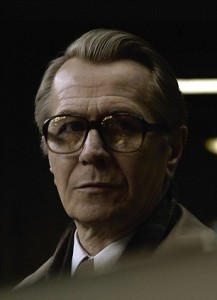
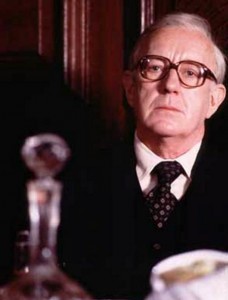
The good news: casting on the film was excellent. Colin Firth was a wonderful Bill Haydon, and I can’t imagine a better Control than John Hurt. The toad-faced actor who played Percy Alleline was great (Toby Jones, who played Karl Rove in the movie W), and accomplished what I had hoped more of the actors in this film would have accomplished: he brought a whole new angle to the role. Michael Aldridge (in the miniseries) seemed slow-witted, a conveniently gullible stooge, while Toby Jones’s Alleline is power-hungry and vindictive. Inner Circle member Roy Bland, a relatively minor character in the miniseries, shines with veteran actor Ciarán Hinds (Julius Caesar in Rome) in the role. He’s not given much to do, but he dominates his every scene.
And Smiley? I doubt anyone will ever top Alec Guinness’s depiction, which reportedly left an indelible mark even on Le Carre. The best anyone can do is not do a terrible job. Oldman is a believable Smiley, but Jake and I both had the same impression: My, doesn’t he do a fine Alec Guinness imitation? He brought nothing new to the role and he brought a whole lot less to it than did Guinness. With Guinness, there’s a wealth of sadness and disillusionment and cynicism. Very little of that came out in Oldman’s version.
The worst criticism, however, concerns the plot. This is a cerebral story. You don’t watch Tinker, Tailor, Soldier, Spy for the gun play and car chases; you watch it for the acting and, well, the story. They’ve nailed the acting fairly well, but in the movie, they’ve glossed over too much to make the story convincing.
In the movie: How does Smiley track down Jim? Why does Toby flip so easily, with relatively little pressure from Smiley & company? Worst of all, how do they know for certain they’ve caught the right mole in the end?
Anyone watching this without past knowledge of the story (and an eidetic memory) will be lost.
I’m left to conclude that some stories are not meant for a two-hour format. You wouldn’t fit LOTR into a two-hour format, would you?
***
In other news, my word count is up to 25,000, and I’ll be writing more today, hopefully finishing Chapter 5.
D.
You got that right . . .
Internet research on World War II led me to a list of “best WW II movies of all time,” which I can’t find at the moment, but which contained a lot of obvious choices (Bridge over the River Kwai, for example) and some films I’d never heard of before. Enter Come and See, of which the list-writer raved, so I thought what the hell. And put it on my Netflix queue.
Tried to watch it tonight. It was incomprehensible to me, perhaps because there’s a vocabulary at play that I do not understand. I noted many sequences of screaming, there were people running around, there was our protagonist looking empty and/or horrified, and things kept getting worse and worse.
It was the best movie I’ve ever fast-forwarded through.
That Wikipedia article has a quote from one of the screenwriters:
I understood that this would be a very brutal film and that it was unlikely that people would be able to watch it.
Yup.
I wanted to appreciate this film. I really did. But I couldn’t even manage to watch it beyond the first half.
D.
Showtime goes all 24
This post is one big spoiler, so if you hate hate hate spoilers, don’t read on.
Still here? I’m about to reveal the name of the program I’m spoiling, and what with that title right up there in humongo-font, if you know anything about 24, then you know what I’m gonna say next.
So, yeah. Karen recorded Homeland for me, and I watched it last night. I asked her to record it for me because I’ve loved Mandy Patinkin’s acting ever since Princess Bride, not to mention the short-lived series Dead Like Me. From the trailers, it looked like an updated Manchurian Candidate with al Qaeda as the puppetmaster, but I had hopes. This is Showtime, after all, not Fox. They can be edgy, right? Right?
Well. Um.
Claire Danes plays Carrie Anderson, a CIA operative who risks everything blah blah blah to get a particle of information: that al Qaeda (essentially) has “turned” an American POW. When an American POW is discovered shortly thereafter, Claire’s convinced that he is the sleeper and will stop at nothing *yawn* to prove that he’s eeevil.
Mind you, I wasn’t being a little bitch just yet. As I said, I had hopes. The first episode was well directed, and the al Qaeda mole, Sgt. Nicholas Brody, looks like nothing more than a very damaged man. Which is what you’d expect from a man who has spent 8 years in a hole, has been tortured, etc. Neither the director nor the screenwriter has tipped his hand, and everything is just ambiguous enough that you could see this story going either way.
About forty minutes into it, I said to Karen, “You know what would be great? If he really is just a POW. Nothing more. And Claire Danes’s character absolutely wrecks this guy’s life, this guy who has already given up about all he can give to his country short of dying for it. This guy who everyone is welcoming back as a hero — he really is a hero, and she wrecks his life all in the name of counter-terrorism.”
I think Karen’s response was something like, “Naw, never gonna happen,” but I had these hopes, see?
So Carrie Anderson with her own money bugs the crap out of this guy. I mean she has every room in his house wired for visual and audio, and she has a couple of guys following him around in a van that can pick up his conversations at a distance, et cetera. ALMOST at the very end, she’s discovered by her mentor (Mandy Patinkin’s character) who advises her to get a lawyer. And I didn’t get this, because if it’s all going to go to hell for her, shouldn’t that happen at the end of the series?
She spends her last night of freedom at a bar trying to pick up some dude for a quick lay, when she twigs to this hand-signal code Brody has been using to signal to someone via national TV — oh, whatever. Bottom line, the show resolves itself into just another 24. It’s okay to thoroughly violate someone’s civil rights if it turns out he’s eeevil. The ends justify the means. Give this series a few more episodes, and Carrie’s gonna torture some vital information out of some poor bastard. You just watch.
Or don’t watch. I think I’ll wait until the series is over and then I’ll check it out on Wikipedia.
D.
Rooting for the apes
We all know how this ends: the humans decline to a faint shadow of their former might, while the apes take over the joint. And just in case there are any noobs in the audience who never saw the Charles Heston original (or, for that matter, the loathsome Mark Wahlberg remake), the movie is named RISE of the Planet of the Apes. Not, The Apes Make a Bit of a Splash Before Getting Themselves Snuffed. The trick, then, lies in building narrative drive when everyone in the audience knows the ending, and the challenge lies in making it an enjoyable business.
For one thing, you gotta start with a hero. Here’s Caesar (yes, he has the same name as Cornelius and Zira’s baby in movie #3 — the filmmakers stayed true to canon at least in that one detail), played by Andy Serkis (Gollum!)
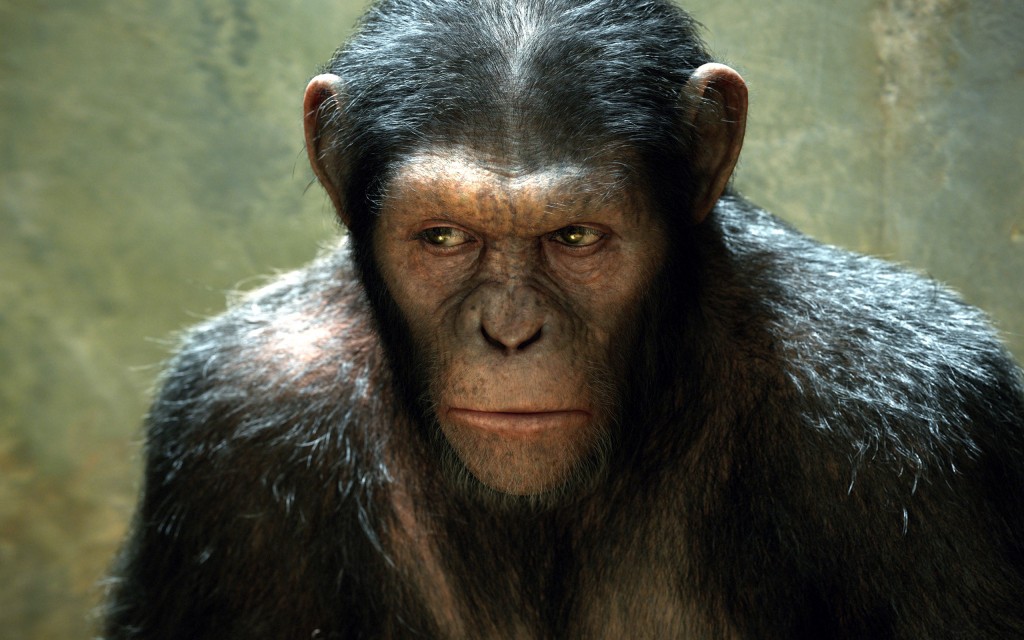
A moment ago, I tried to identify for Jake a few notable characteristics of heroes. They have to be in nearly every scene (check), and the writer needs to show some care not to trash sympathy for the hero (check), lest he end up with, for lack of a better term, a creep. Finally, the hero must take a lot of abuse (check). By the way, does anyone recall the proper term for this last feature? I learned it in high school and I can’t recall the details.
And in Caesar’s heroic status he has no competitors. I guess we are supposed to like his “father,” Dr. Will Rodman (James Franco), a Gen Sys* scientist working on the cure for Alzheimer’s disease. Turns out this virus also increases the intelligence of its host, which spells $$$ for the corporate overlords of Gen Sys. But Rodman is such a dip. He calls apes “monkeys,” something no self-respecting scientist would ever do. And when he meets some initial set-backs to his quest to cure his father’s Alzheimer’s with viral-mediated gene therapy, what does he do? Create a more virulent, air-borne vector. So not a hero. More like a Bond villain, really. But he has a cute girlfriend (Freida Pinto, whom some of you may have seen in Slumdog Millionaire) so that’s okay.
I have to think that Dr. Rodman’s dweebiness is intentional. He’s a weak man, and when Caesar blames him for his (Caesar’s) misfortunes, we can’t help but blame him, too. But I’m getting ahead of myself.
Here, skip this paragraph if you’re worried about some mild spoilers. In fact, maybe skip the rest of the post. Anyway: when Rodman’s earlier virus makes a test subject go berserk, he’s forced to put down all the apes in his group. But it turns out the berserker was merely protecting her baby — Caesar! Who has mommy’s green eyes, indicating that he, too, has inherited the intelligence of his mother. Rodman smuggles Caesar home and raises him like a human child, taking no precautions whatsoever even when Caesar grows up to be a big, powerful adult chimpanzee. For that matter, Rodman’s dad (John Lithgow) is not doing too well, Rodman’s guinea pigging efforts notwithstanding, and should probably be in a care facility. So when Caesar’s and Dad’s lack of proper housing leads to a violent attack on a neighbor, Rodman is really to blame here. Just sayin’. And that lands Caesar in a primate care facility which Rodman has apparently neither researched nor examined beyond the most superficial tour. This does not end well**. Man, the more I think about Franco’s character, the more he pisses me off. Monkeys. Really.
The movie’s science does not hold up to close scrutiny. There’s that whole virulent respiratory virus thing, for starters. But I don’t go to a movie like this thinking I’m gonna have a hard SF experience.
So what do we have, really? Obnoxious humans whom we are only too happy to see self-immolate. (And they do. Gloriously. But you’ll have to sit through the credits to see it.) And a rage-filled Caesar who has our every sympathy. Our attachment to Caesar and desire to see him and his fellow apes shed their chains, that’s what drives this film forward. Yeah, I loved it. And so does PETA. Okay, so PETA loved it because the filmmakers used CGI apes, not because the humans snuff it (we presume) in the end. But I’m betting more than a few PETA members loved seeing the apes get back at the research scientists.
Not a subtle movie, though. Never thought I would say this, but I think the original Planet of the Apes had a good deal more moral ambiguity than this one. Perhaps today’s audiences can’t handle moral ambiguity?
D.
*Not to be confused with GeneSys.
**Unless you’re Caesar
